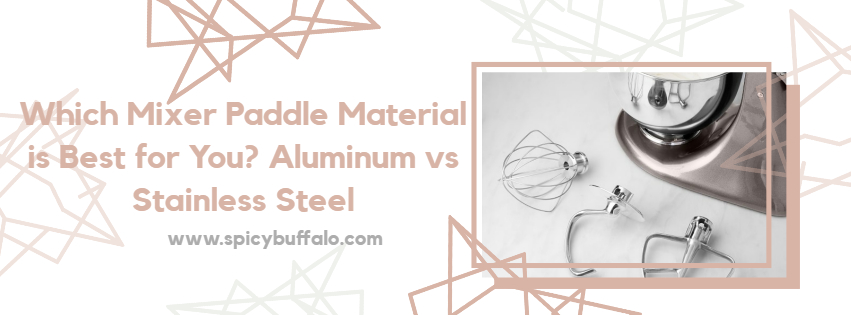
In choosing mixers, there are a lot of different factors you need to consider to make the best purchase for your needs. One of the most important decisions is what material to choose for the mixer paddle. aluminum vs stainless steel paddles both have their advantages and disadvantages, so it can be tough to decide which one is right for you. In this blog post, we will break down the pros and cons of each material so that you can make an informed decision about which mixer paddle is best for you!
Aluminum mixer paddles are popular because they are lightweight and durable. However, aluminum can also be a softer metal, which means it is more likely to bend or warp over time with heavy use. Stainless steel mixer paddles are much heavier than aluminum paddles, but they are also much less likely to warp or bend over time. Stainless steel is also a non-reactive metal, which means it won’t rust or corrode over time. However, stainless steel paddles can be more difficult to clean because they tend to hold onto stains and odors more than aluminum paddles.
Is aluminum better than stainless steel?
It depends on what you need! If you need a light weight and durable paddle, go with aluminum. If you need a paddle that is more resistant to stains and odors, then stainless steel is the way to go. No matter which material you choose, make sure to clean your mixer paddle regularly to keep it in top condition!
Is there a huge difference between aluminum and stainless steel?
The main difference between aluminum and stainless steel is that aluminum is a softer metal, while stainless steel is much harder. This means that aluminum paddles are more likely to warp or bend over time, while stainless steel paddles will last longer. However, both materials are durable and easy to clean, so it really comes down to personal preference!
Is aluminum more expensive than stainless steel?
Aluminum is often more expensive than stainless steel because it is a softer metal.
What lasts longer aluminum or steel?
Mixer paddles made of stainless steel are significantly heavier than aluminum ones, but they are also less likely to bend or warp with time. Stainless steel is a non-reactive material, so it won’t rust or corrode over time. Stainless steel paddle cleaning, on the other hand, maybe more difficult because they tend to accumulate stains and odors more than aluminum paddles.
What are the advantages of aluminum?
Aluminum mixer paddles are popular because they are lightweight and durable. However, aluminum can also be a softer metal, which means it is more likely to bend or warp over time with heavy use.
Do aluminum mixers corrode?
No, aluminum mixers do not corrode.
Is stainless steel safer than aluminum?
There is no definitive answer to this question as both materials have their advantages and disadvantages. Stainless steel is a non-reactive metal, which means it won’t rust or corrode over time. However, stainless steel paddles can be more difficult to clean because they tend to hold onto stains and odors more than aluminum paddles. Aluminum is a softer metal, which means it is more likely to bend over time with heavy use. It is up to the individual to decide which material is best for them!
What are the pros and cons of each mixer paddle material?
Aluminum:
-Lightweight and durable
-Can be a softer metal, which means it is more likely to bend or warp over time with heavy use
Stainless steel:
-Much heavier than aluminum paddles, but they are also much less likely to warp or bend over time
-Non-reactive metal, which means it won’t rust or corrode over time
-Paddles can be more difficult to clean because they tend to hold onto stains and odors more than aluminum paddles
Do you have any tips for choosing the right mixer paddle material? Let us know in the comments below! Happy baking!









